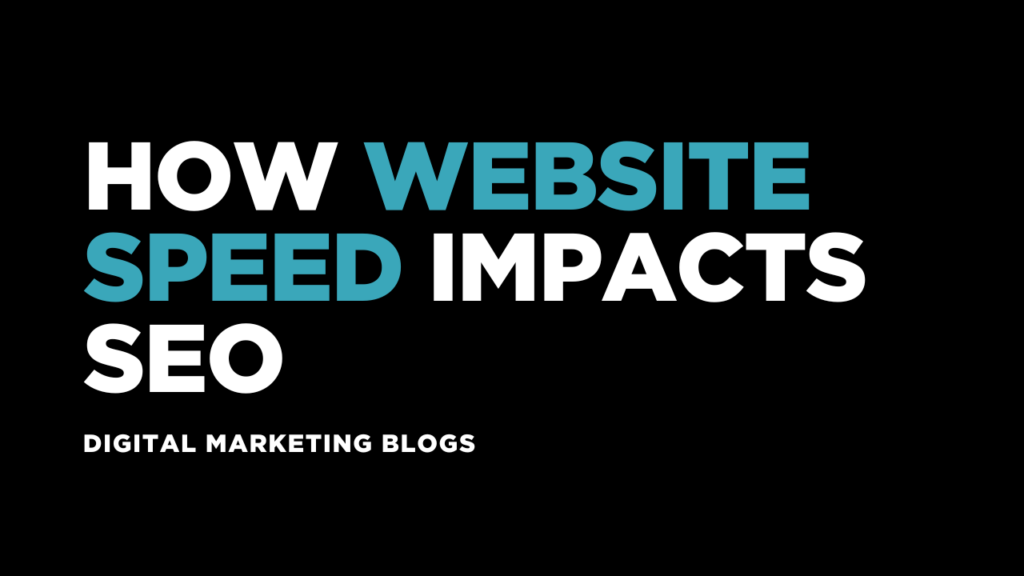When it comes to improving your website’s visibility on search engines, there are many factors to consider. One of the most overlooked but critical ones is website speed. In today’s fast-moving digital world, users expect websites to load quickly—and search engines like Google take this expectation seriously.
What Is Website Speed?
Website speed refers to how quickly a website loads when someone visits it. It’s usually measured in seconds and includes the time taken for your content—text, images, videos, and other elements—to fully appear on the screen.
Why Does Website Speed Matter for SEO?
1. Google Uses Speed as a Ranking Factor
Google has officially stated that page speed is a ranking signal. If your website is slow, it could rank lower than faster websites, even if your content is good. Especially after the Core Web Vitals update, website performance is more important than ever.
2. Slow Websites Increase Bounce Rate
Visitors won’t wait around for a slow site to load. Most users expect a website to load within 2–3 seconds. If it takes longer, they leave. This increases your bounce rate, which sends a negative signal to search engines.
3. Fast Websites Improve User Experience
User experience is a core part of modern SEO. A fast website keeps users engaged, helps them find what they’re looking for quickly, and encourages them to explore more pages. This improves your overall session time and lowers the bounce rate—both of which help your SEO performance.
How Website Speed Affects Mobile SEO
More than 60% of web traffic now comes from mobile devices. Mobile users often rely on slower internet connections. If your site isn’t optimized for mobile speed, you risk losing a large share of your audience.
Google uses mobile-first indexing, meaning it mostly uses the mobile version of your content to rank pages. If your mobile site is slow, your rankings can be affected—even for desktop users.
Common Reasons for Slow Website Speed
Understanding what causes slow website performance is the first step to fixing it. Here are some common issues:
-
Large images that are not compressed
-
Too many plugins or scripts
-
Unoptimized CSS and JavaScript files
-
Poor hosting server response times
-
Lack of browser caching
-
No use of content delivery network (CDN)
How to Check Your Website Speed
There are free tools you can use to analyze and understand your website’s performance:
-
Google PageSpeed Insights – Gives you detailed suggestions to improve speed
-
GTmetrix – Offers performance scores and waterfall loading timelines
-
Pingdom Tools – Good for visual speed tracking and location-based tests
These tools also provide suggestions on how to fix performance issues step-by-step.
Practical Steps to Improve Website Speed
If you want better SEO results, here are some simple ways to speed up your website:
-
Compress Images: Use tools like TinyPNG or WebP format to reduce file size.
-
Enable Caching: Helps store parts of your website in the browser so it loads faster on return visits.
-
Use a CDN: Content Delivery Networks speed up content delivery based on user location.
-
Minimize HTTP Requests: Reduce the number of elements on your page that need loading.
-
Choose Better Hosting: Shared hosting often leads to slow websites. Consider managed or cloud hosting.
-
Limit External Scripts: Each third-party script can add loading time.
Website Speed and Your Business Goals
Whether you’re running an e-commerce store, a blog, or a business website, speed directly affects your results. A faster website not only brings better rankings but also higher conversions. If you’re investing in digital marketing, ignoring speed means losing both traffic and money.
Learn More from a Digital Marketing Trainer
If you’re trying to improve your website performance and don’t know where to begin, learning the basics of SEO and speed optimization can help. As a digital marketing trainer, I always encourage beginners and business owners to understand the connection between performance and visibility.
Even small changes—like image compression or a better hosting plan—can bring big SEO benefits.
Final Thoughts
Website speed is no longer optional—it’s essential. It affects how users experience your site and how Google ranks it. Investing time and effort into improving your site’s speed can lead to better rankings, more visitors, and higher engagement.
If you’re looking for expert guidance, whether as a business owner or a learner, a professional digital marketer in Calicut can help you analyze your site, improve its performance, and grow your online presence the right way.



